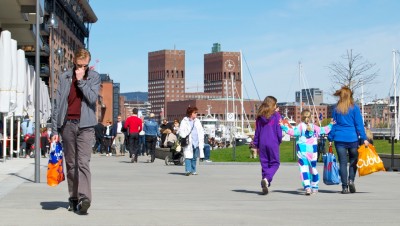 COMMENTARY: The Norwegian Study of Power and Democracy was a five-year government-mandated effort overseen by five academic experts charged with assessing what’s going on with democracy in Norway. This heroic undertaking, recalls journalist and author Solveig Torvik (photo), bore the imprint of the Crown and resulted in 50 books by more than 100 authors, yet only one hour was allotted to a 2003 briefing in Parliament (Storting) on the study’s conclusions. The study and its findings sank like a stone, even though it highlighted worrisome areas of decline in Norwegian democracy.
COMMENTARY: The Norwegian Study of Power and Democracy was a five-year government-mandated effort overseen by five academic experts charged with assessing what’s going on with democracy in Norway. This heroic undertaking, recalls journalist and author Solveig Torvik (photo), bore the imprint of the Crown and resulted in 50 books by more than 100 authors, yet only one hour was allotted to a 2003 briefing in Parliament (Storting) on the study’s conclusions. The study and its findings sank like a stone, even though it highlighted worrisome areas of decline in Norwegian democracy.
“The report was discussed very little and that’s the disappointing part of it,” says the Storting’s Secretary General Hans Brattestaa. “It’s rather depressing to see what happens at the end of the road because nothing really happens and no decisions are taken.” Americans are well-acquainted with similar outcomes whenever panels of experts are deputized to assess daunting social/political problems.
The study did get some thoughtful attention in England. Stein Ringen, professor of sociology and social policy at Oxford University, wrote in The Times’ Literary Supplement that much is going right in Norway, a cohesive nation with weak social conflicts, high quality of life and “a content and optimistic population…”
As he put it: “By European standards, crime is low, the law lenient, and the prison population small. Governance is honest and benevolent, democratic institutions retain high legitimacy and voter participation is comparatively high (but falling).” Thanks to Norway’s oil, he noted, “the government’s problem is an unmanageable surplus.”

But Ringen also pointed to less positive developments, particularly that the central government has usurped the power of local municipalities and that political parties, because they’re subsidized by taxpayers, have become unaccountable to the will of their members.
“The decline in local democracy is driven in part by the irrationalities in the organization of the welfare state,” Ringen wrote. “Central government has power without responsibility and the local government has responsibility without power.” This conflict has risen again recently in the ongoing debate over funding for nursing homes and transportation improvements. The local governments are charged with providing such social services as nursing home care and public transit systems, but they in turn rely on funding allocations from the state.
“Citizens need feel no inhibition in making ever-greater demands on the municipal authorities because their demands are sanctioned by the Storting,” Ringen continued. “Nowhere in this spiral are dues and duties linked and no one is in control.”
The message of the democracy study is that the decline in Norway’s democracy is caused by “a demise of local government, in election and party systems, in a lack of accountability in the welfare state, in the courts and judicial review,” he added.
That’s a big accountability deficit for a purportedly democratic nation. But it squares with complaints by Norwegians that they often find it difficult to pinpoint accountability and responsibility in their bureaucracies and political system.
“Deny political parties subsidies and make them compete for members. Shape the election system so that government formation follows the outcome of the vote and so that governments hold enough power to rule,” Ringen quite rightly argued.
British political commentator Simon Jenkins also weighed in on the study at The Times Online in an article titled “Democracy is dying but we’re too rich to care.”
His take was that “The Storting’s proportional representation is disastrous for most Norwegians,” who, he wrote, “feel cheated and ignored by a shifting state army of politicians in Oslo. The Storting has lost public respect and seems no more than a talent pool for government.”
Asked if he agreed with the assessment that there’s a lack of accountability in the Norwegian political system, sociology professor Fredrik Engelstad, head of the study and of the Institute of Social Research, said, “I have to admit I haven’t reacted that way.” But, he added, “The parties have become a bit arrogant.”
Three men and two women were on the oversight committee, and the women filed a dissent. Siri Meyer, professor of humanities at the University of Bergen, said the men concluded that the growing power of pressure groups and the media was undermining democracy in Norway because the traditional, time-honored political method – reasoned consideration by members of Storting – was eroding, with a consequent “loss of rationality.” The women disagreed. They championed a more open, less paternalistic system.
For example, the fact that news media can be used by individuals to press political demands was considered a bad thing by the men, according to Meyer. “I don’t think so,” she said.
Ringen, meanwhile, noted that the term “order” was much used in the committee’s summary to describe how things once were in Norway and “disorder” for the way things are now. He gently suggested that this disturbing new disorder might not be entirely bad for Norwegian society.
“But there is also something liberating in the clearing away of a paternalistic all-present cobweb of ‘groups,’ and modern assertive citizens may well be satisfied to have a bit less of someone else’s order weighing down upon them,” he wrote.
As well they may.
Solveig Torvik is a Norwegian-American political journalist and author of “The World’s Best Place: Norway and the Norwegians,” available as an e-book or printable document at www.smashwords.com.
Opinions expressed in commentaries published by “Views and News from Norway” do not necessarily reflect the views of the website but are meant to spur thought and reader response. Please offer your own views in our Reader Response feature.

